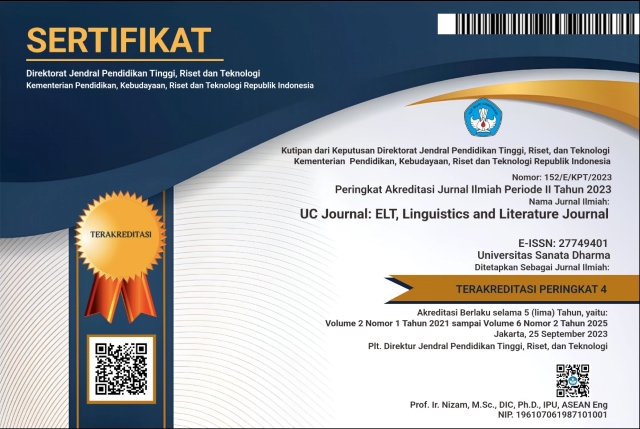ENGLISH EDUCATION STUDENTS CLASSROOM MANAGEMENT PROBLEMS DURING THE SCHOOL PRACTICE PROGRAM
(1) Independent Contributor, Yogyakarta
(*) Corresponding Author
Abstract
Keywords
Full Text:
PDFReferences
Brophy, J., & Evertson, C. M. (1976). Learning from teaching: A developmental perspective. Needham Heights, MA: Allyn and Bacon.
Clark, D. (1993). Teacher evaluation: A review of the literature with implications for educators. Retrieved May 19, 2014, from http://files.eric.ed.gov/fulltext/ED359174.pdf
Collins, A. (1990). Transforming the assessment of teachers: Notes on a theory of assessment for the 21st century. Retrieved May 15, 2014, from http://files.eric.ed.gov/fulltext/ED321362.pdf
Darhim. (n.d). Guru Efektif. Retrieved May 10, 2014, from http://file.upi.edu/Direktori/FPMIPA/JUR._PEND._MATEMATIKA/19550 3031980021-DARHIM/Strategi_dan_Perenc_Pemb_Mat/GuruEfektif.pdf
Fraenkel, J., & Wallen, N. (2009). How to design and evaluate research in education. New York: McGraw-Hill Companies.
Gall, M., Gall, J., & Borg, W. (2003). Educational research: An introduction ( ed.). Boston: Pearson Education.
Hue, M. T. (2005). Preliminary findings: The social construction of classroom discipline in Hong Kong secondary schools. Funded by an Internal Research Grant, the Hong Kong Institute of Education.
Hue, M. T., & Li, W. S. (2008). Classroom management: Creating a positive learning environment. Hong Kong: Color Print Production.
Jones, F. H. (2000). Tools for teaching. Santa Cruz, CA: Fred H. Jones & Associates. Jones, J., Jenkin, M., & Lord, S. (2006). Developing effective teacher performance. London: Paul Chapman.
Kapalka, G. M. (2009). 8 steps to classroom management success: A guide for teachers of challenging students. Thousand Oaks, CA: Corwin.
Luo, J., Bellows, L., & Grady, M. (2000). Classroom management issues for teaching assistants. Research in Higher Education, 41(3), 370-371.
Marzano, R. (2003). Classroom management that works. Alexandria, VA: Association for Supervision and Curriculum Development.
Muijs, D., & Reynolds, D. (2005). Effective teaching: Evidence and practice. London: Paul Chapman Publishing.
Oliver, R., & Reschly, D. (2007). Effective classroom management: Teacher preparation and professional development. Retrieved May 10, 2014, from http://files.eric.ed.gov/fulltext/ED543769.pdf
Pagliaro, M. M. (2011). Educator or bully? Managing the 21-st century classroom. Plymouth: Rowman & Littlefield. Poplin, et al. (2011). Highly effective teachers in low-performing urban schools. Phi Delta Kappan, 92, 3943.
Quanglia, R. (1989). Socialization of the beginning teacher: A theoretical model from the empirical literature. Retrieved May 10, 2014, from http://jrre.vmhost.psu.edu/wp-content/uploads/2014/02/5-3_1.pdf
Sakui, K. (2007). Classroom management in Japanese EFL classrooms. JALT Journal, 29(1), 47-49.
Smart J., & Igo, L. (2010). A grounded theory of behavior management selection, implementation, and perceived effectiveness reported by first-year elementary teachers. Elementary School Journal, 110(4) 56784.
Stronge, J. H., Tucker, P. D., & Hindman, J. L. (2000). Handbook for qualities of effective teachers. Alexandria, VA: ASCD.
Tauber, R. (2007). Classroom management: Sound theory and practice.
Westport, CT: Praeger. Veenman, S. (1984). Perceived problems of beginning teachers. Review of Educational Research, 54, 143178.
Vogt, W. (1984). Developing a teacher evaluation system. Spectrum, 2(1), 41-46.
Wiseman, D., & Hunt, G. (2014). Best practice in motivation and management in the classroom. Springfield, IL: Charles C Thomas.
Yasar, S. (2008). Classroom management approaches of primary school teachers. Retrieved May 10, 2014, from http://etd.lib.metu.edu.tr/upload/12610051/index.pdf
DOI: https://doi.org/10.24071/uc.v1i2.3028
Refbacks
- There are currently no refbacks.
Copyright (c) 2020 Bonaventura Estu Parasdya

This work is licensed under a Creative Commons Attribution-ShareAlike 4.0 International License.
UC Journal is indexed in:
UC Journal Sinta 4 Certificate (S4 = Level 4)
We would like to inform you that UC Journal: ELT, Linguistics and Literature Journal, or UC Journal has been nationally accredited Sinta 4 by the Ministry of Education, Culture, Research and Technology of the Republic of Indonesia based on the decree No. Surat Keputusan 152/E/KPT/2023. Validity for 5 years: Vol 2 No 1, 2021 till Vol 6 No 2, 2025
DOI: https://doi.org/10.24071/uc
e-ISSN (validity starting Vol 1, No 2, November 2020): 2774-9401

This work is licensed under CC BY-SA.
Creative Commons Attribution-ShareAlike 4.0 International License
 UC Journal: ELT, Linguistics and Literature Journal, a scientific peer-reviewed journal, was established in 20 May 2020 and is published twice a year, namely in May and November, by the English Language Education Study Programme (S1/Sarjana PBI) in collaboration with the English Education Master's Programme (S2/Magister PBI) of Sanata Dharma University, Yogyakarta, Indonesia.
UC Journal: ELT, Linguistics and Literature Journal, a scientific peer-reviewed journal, was established in 20 May 2020 and is published twice a year, namely in May and November, by the English Language Education Study Programme (S1/Sarjana PBI) in collaboration with the English Education Master's Programme (S2/Magister PBI) of Sanata Dharma University, Yogyakarta, Indonesia.














